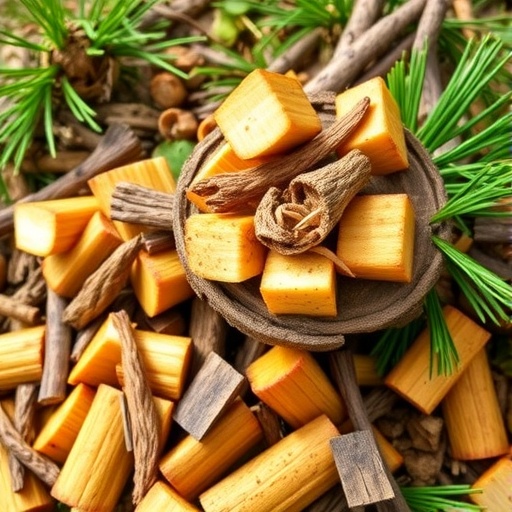In a groundbreaking study that explores the intersection of mycology and waste management, researchers have illuminated the potential of the mycelium of Pleurotus abieticola, a mushroom species, in transforming nematode-infected pine trees into valuable nutritional resources. The findings of this research provide significant insights into how we can harness nature’s processes to combat environmental challenges while simultaneously generating beneficial outcomes for various industries.
The impact of nematode infections on pine trees has been a growing concern, particularly in relation to forest health and ecosystem sustainability. Nematodes, which are microscopic worms, can cause substantial damage to trees, resulting in their decline and eventual death. This not only jeopardizes the integrity of forests but also contributes to increased carbon emissions as dead trees are not able to sequester carbon. Researchers have now discovered that these seemingly ruined trees can be repurposed, with the help of mycelium, into something that benefits society.
The study introduces the concept of mycoconversion chips, innovative bioproducts derived from the decomposition of infected pine biomass through fungal action. Essentially, these chips serve as a foundation for nutrient-rich substrates, thanks to the efficient breakdown mechanisms of Pleurotus abieticola. This species is known for its ability to decompose lignocellulosic material, which is abundant in pine trees, enabling researchers to tap into this potential for converting waste into valuable resources that can be utilized in various applications.
Fungi play a crucial role in nutrient cycling and ecosystem functioning, and Pleurotus abieticola is no exception. By promoting the growth of this species, researchers were able to maximize its lignin-degrading enzymes, effectively breaking down the robust structural components of the infected trees. The breakdown process not only makes nutrients more accessible for plant uptake but also enriches the soil, thereby promoting healthier ecosystems. This innovative approach to biomass valorization highlights the importance of sustainability in addressing global food security issues.
Moreover, the research indicates that these mycoconversion chips can serve as a sustainable alternative to conventional fertilizers. With the push towards organic farming and the reduction of chemical inputs, the potential use of these chips in agriculture could lead to enhanced soil fertility without the adverse effects commonly associated with synthetic fertilizers. This aligns with the growing demand for environmentally friendly agricultural practices that prioritize soil health and biodiversity.
The economic implications of this research cannot be understated. Turning nematode-infected pine trees into mycoconversion chips represents a viable business model for forest management and the recycling of waste materials. Forestry operations often face financial losses due to tree mortality caused by nematode infestations. By leveraging the properties of Pleurotus abieticola, these operations can transform their losses into new avenues for profit, effectively creating a circular economy within forestry.
With climate change posing an existential threat to global food systems, the necessity to find alternative and sustainable sources of nutrition has never been more urgent. The ability to convert waste from infected pine trees into nutrient-rich products through fungal technology holds promise for addressing food shortages and enhancing food security, particularly in regions where traditional agriculture is hindered by adverse conditions.
The broad application potential of mycoconversion chips extends beyond agriculture. Thanks to their nutrient-rich profile, these chips could play a significant role in animal feed, bioenergy production, and even pharmacological developments. The versatility of these bioproducts could lead to a paradigm shift in how we source nutritional resources, minimizing reliance on synthetic alternatives and fostering a more sustainable interaction with our ecosystems.
An additional layer of significance stems from the research’s contribution to the fields of ecology and biodiversity. Promoting the growth of fungi like Pleurotus abieticola may help restore balance to ecosystems adversely affected by invasive nematodes, aiding in the re-establishment of native flora and fauna. This underscores the interconnectedness of various biological components and emphasizes the importance of preserving fungal biodiversity in combating ecological disturbances.
The researchers behind this study suggest that the future of waste management could very well lie in symbiotic relationships between plants, fungi, and microorganisms. By focusing on the natural processes that occur within ecosystems, we can develop more eco-friendly technologies that not only mitigate the impact of invasive species but also foster regeneration and resilience within our natural environments.
As scientists continue to explore the potential of various fungal species in waste conversion, the findings of this study pave the way for further exploration of mycorrhizal relationships and their applications. The integration of microbiology with agricultural practices has the potential to revolutionize how we approach soil management, crop production, and waste recycling, moving us towards a more sustainable future.
The studies of Pleurotus abieticola are a testament to how innovative thinking can yield powerful solutions to some of our most pressing environmental challenges. By increasing awareness of our natural allies in this fight, we can begin to see a significant paradigm shift in our strategies for addressing ecological issues. Embracing these technologies offers a dual benefit: preserving our forests while also ensuring a more sustainable food supply for future generations.
In conclusion, the research surrounding Pleurotus abieticola, particularly in relation to mycoconversion chips, illustrates a significant advancement in the realm of sustainability and waste management. The potential applications in agriculture and beyond reflect an exciting frontier in scientific research and environmental stewardship. As we continue to innovate and harness the power of nature, the possibilities for creating a sustainable future grow ever more promising.
Subject of Research: Mycoconversion of nematode-infected pine trees into nutritional resources
Article Title: Pleurotus abieticola: Mycoconversion Chips from Nematode-Infected Pine Trees into Nutritional Resources
Article References:
Yuan, P., Yue, Y., Li, L. et al. Pleurotus abieticola: Mycoconversion Chips from Nematode-Infected Pine Trees into Nutritional Resources.
Waste Biomass Valor (2025). https://doi.org/10.1007/s12649-025-03353-6
Image Credits: AI Generated
DOI:
Keywords: Mycology, sustainability, Pleurotus abieticola, nematodes, waste management, agriculture, nutrient cycling.
Tags: bioproducts from pine biomasscarbon sequestration challengescombating forest health issuesecological restoration through fungienvironmental sustainability solutionsfungal decomposition processesmycoconversion chips innovationmycology and waste managementnematode-infected pine treesnutrient-rich substrates creationPleurotus abieticola benefitsrepurposing damaged trees





